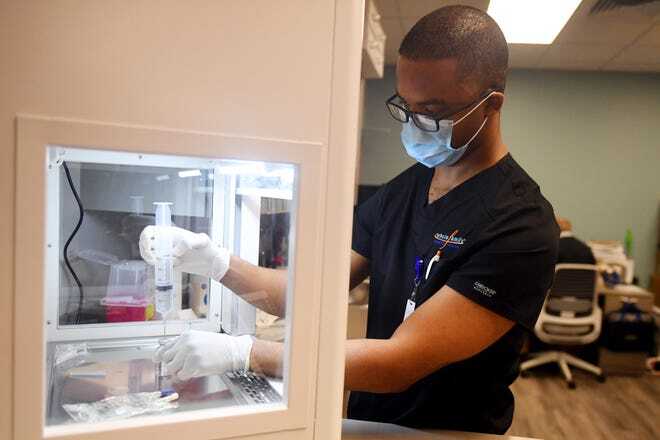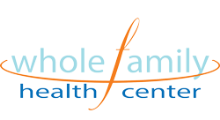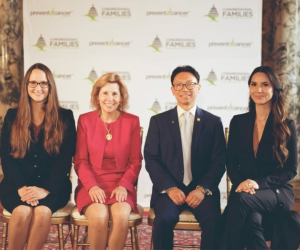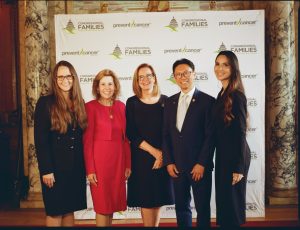Laurence Reisman | 17 Feb, 2021

Susan Klinsport makes her living by keeping people safe from germs.
“I’ve been really careful (amid COVID-19),” said Klinsport, 58, noting she stopped going to the gym and, for the most part, dining out, in the hope of keeping her parents, 86, who lives with her, safe.
Then the holiday season came and a good friend asked her over for a glass of wine.
When she got to the friend’s home, one of the hosts was resting with “a minor head cold.” The two exchanged pleasantries from 6 to 10 feet away before a handful of people spent about 20 minutes socially distanced over a drink in the other room.
Two days later on a Saturday, Klinsport’s friend called to apologize. The friend was ill with the novel coronavirus.
“I had like a full day of, ‘hey, I’m OK,’ ” said the single Vero Beach woman, whose company, makes antimicrobial, nonwoven material as toothbrush and mouth guard shields in Grand Rapids, Michigan.
But on Sunday morning there was a throat tickle and minor cough. The next day she barely got the dog out for a walk before having to return home and go to bed.
“I wanted somebody to remove my eyeballs because they hurt so badly,” said Klinsport, noting she felt far worse than when she’d had pneumonia.
She used over-the-counter medication to handle fever and on Tuesday went to the only place she could find for a test. Unfortunately, the lab measured only antibodies in her blood, she said, and it was negative.
“At that point, I’m feeling frantic about my parents,” she said, noting she’s their caregiver. If she went down they not only could get ill but have no one to care for them
On Wednesday she heard her parents starting to cough, so she called her primary care physician, who told her to get tested at the Whole Family Health Center in either Vero Beach or Fort Pierce. Klinsport went online and got an appointment for her mother on Friday, but couldn’t get another one for herself or her father until Monday.
So she emailed the nonprofit center and within the hour got a call telling her to bring everyone in early the next morning.
“We all came up positive,” said Klinsport, noting she tried to make arrangements to have medicine and groceries delivered.
At 6 p.m. she said she got a call from Dr. Gerald Pierone, the center’s chief medical officer and founding physician. Pierone, who said he starts his seven-day-a-week job at 6 a.m. daily, told Klinsport her parents, because of their age and early diagnosis, were flagged to be treated with bamlanivimab. He told them to come to his Fort Pierce office the next day.
Bamlanivimab, approved for emergency use by the U.S. Food and Drug Administration, contains human-made antibodies similar to those of patients who recovered from COVID-19, according to its manufacturer, Eli Lilly & Co. The expectation is those antibodies fight the virus quicker.
That’s exactly what happened when Klinsport, who agreed to be infused with what Pierone calls “bam-bam” in a clinical trial conducted without placebo, and her parents were treated.
“Within 24 hours, we started to feel better,” she said. Her parents, whose cases were not as far along, recovered first.
Their improvements were not unlike those of Donald Trump, former New Jersey Gov. Chris Christie and former New York City Mayor Rudy Giuliani, who received similar antibody treatment when they tested positive for COVID-19 late last year.
Eli Lilly has touted the antibody cocktail’s success and continues to do more research. In early January federal officials urged COVID-19 patients to request treatment with antibodies. Bamlanivimab, originally given in about an hour through an IV, is supposed to be given as soon as possible after a positive test and within 10 days of symptom onset.
Pierone said his clinic had treated 77 high-risk patients as of Feb. 15.
“Most of the patients we have treated tell our team that their symptoms improve by the next day, especially if they are treated within several days of onset of their symptoms,” Pierone wrote in an email.
Only three were hospitalized; two of whom were released. One remains at Cleveland Clinic Indian River Hospital, he said Tuesday.
Pierone said the clinic plans to continue treating patients with the “bam-bam,” noting that eventually it will be combined with Lilly’s etesevimab.
Cleveland Clinic does not offer such treatment to non-hospitalized patients in Indian River County, but hospital spokesperson Scott Samples said there are options at an infusion center in Stuart.
“Patients who test COVID-19 positive within 10 days of treatment and are symptomatic,” he said in an email, “are screened by an infectious disease specialist to determine eligibility” (65 and over or younger with high-risk medical issues).
“This therapy can reduce the need for hospitalizations in high-risk patients,” said Dr. Fernando Petry, chief medical officer at Cleveland Clinic Martin Health. “Having these new treatment options available can lessen the impact of this disease on our community.”
Patty Montgomery, director of marketing for Sebastian River Medical Center, said its parent company, Steward Health Care, offers monoclonal antibodies in Rockledge to patients referred by their primary care providers.
Three weeks out, Klinsport said, her face still felt like it had something on it. Walking or running a quarter mile gave her chest pain.
“I could get really emotional about it,” she said. “It makes me feel closer to the stories I’ve read … about people who were not so lucky. They were just stories before; now I can picture that happening.”
To Klinsport, the real story is the Whole Family Health Center and Pierone, who goes above and beyond to help people. She didn’t know about it until recently.
“He called out of the blue at night,” she said. “His staff — they’re like angels, or heroes, they care so much. They’re into keeping everyone so healthy and safe.”
Jerry Zollenberg, 83, has been Pierone’s patient for almost two decades. A few weeks ago he played golf, got home, and was too weak to walk up to his stairs. He called Pierone, got in right away, tested positive, and received bamlanivimab.
“It was crazy,” he said, noting he was back to normal in a couple of days. “I thank my lucky stars.”
Zollenberg has been so appreciative of Pierone’s care over the years he donates financially to its mission.
The center, whose roots were as an AIDS clinic in Fort Pierce in 1995, has evolved into a federally designated multi-specialty health organization that helps treat underserved populations and provides COVID-19 vaccinations. In addition, the Pierone Research Institute, a center initiative, has been conducting clinical research as part of the federal Operation Warp Speed.
Recently, the institute began a new clinical trial on a monoclonal antibody cocktail produced by Brii Biosciences, Pierone said. The study is part of the National Institutes of Health’s Accelerating COVID-19 Therapeutic Interventions and Vaccines program. If you are interested in taking part in a study, contact the center at 772-978-9556.
Like Pierone, Klinsport’s job is keeping people healthy. Just like you need to keep the toothbrush you put in your mouth every day clean, it’s important to keep others safe.



